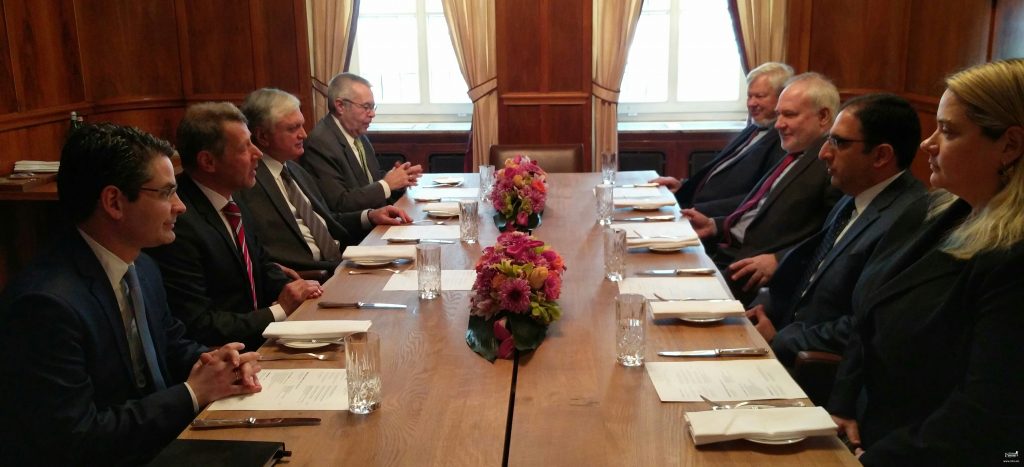MUNICH, Germany (A.W.)—On Feb. 16, the Co-Chairs of the Organization for Security and Cooperation in Europe (OSCE) Minsk Group—Ambassadors Igor Popov of the Russian Federation, Stephane Visconti of France, and Richard Hoagland of the United States of America—met with the Foreign Minister of Armenia Edward Nalbandian and the Foreign Minister of Azerbaijan Elmar Mammadyarov, separately and then jointly. The Personal Representative of the OSCE Chairperson-in-Office, Ambassador Andrzej Kasprzyk, also participated in the meetings.

A scene from the meeting between the Minsk Group Co-Chairs and Minister Nalbandian (Photo: Press Office of Armenia’s Ministry of Foreign Affairs)
According to the press office of Armenia’s Ministry of Foreign Affairs, during their meeting, Nalbandian emphasized that Azerbaijan continues violations of the 1994-1995 trilateral ceasefire agreements and accompanies it with threats to solve the issue by military means. Nalbandian stressed that Azerbaijan’s actions are in direct defiance to the commitments and numerous demands of the Minsk Group Co-Chair countries.
According to a press statement released by the Minsk Group, the current situation along the Line of Contact (LoC) and the Armenia–Azerbaijan border were discussed during the meetings. “The Co-Chairs reiterated that there is no alternative to a peaceful solution to the conflict and that war is not an option, and called upon the sides to exercise restraint on the terrain as well as in their public communications and to prepare their population for peace and not for war,” read a part of the statement.
The Co-Chairs also urged both sides to adhere strictly to the 1994/95 ceasefire agreements that constitute the foundation of the cessation of hostilities and stressed to the Ministers the need to demonstrate “greater flexibility” and to resume comprehensive negotiations on reaching a lasting settlement as soon as possible.
“The Co-Chairs recalled the May 2011 joint statements of their Presidents in Deauville emphasizing that the use of force would only bring more suffering and devastation and would be condemned by the international community. The Co-Chairs shared their views with the Sides on the steps which should be taken toward implementing decisions from the 2016 Summits in Vienna and St. Petersburg aimed at stabilizing the situation in the conflict zone,” read a part of the statement released by the Minsk Group.
During the meetings, the Co-Chairs recognized that the Armenian authorities’ recent decision to return the body of an Azerbaijani serviceman was a helpful humanitarian gesture. Both Foreign Affairs Ministers also reiterated their commitment to strictly observe their international humanitarian obligations including those of the Astrakhan Declaration of Oct. 2010 issued by the Presidents of Armenia, Azerbaijan, and Russia.
The Co-Chairs commented on what it called the “so-called constitutional referendum,” scheduled to take place in Artsakh (Nagorno-Karabagh/NKR) on Feb. 20. “Although the Co-Chairs note that the de-facto Nagorno-Karabagh authorities view the use of such a procedure as an effort to organize the public life of their population, they underscore again that no countries, including Armenia and Azerbaijan, recognize Nagorno-Karabagh as an independent and sovereign state,” read a part of the statement, which stated that the Co-Chairs do not accept the results of the referendum as affecting the legal status of Nagorno-Karabagh.
“The Co-Chairs also stress that the results in no way prejudge the final status of Nagorno-Karabagh or the outcome of the ongoing negotiations to bring a lasting and peaceful settlement to the Nagorno-Karabagh conflict,” read a part of the statement.
The Co-Chairs also said that they plan to travel to the region in March.
Source: Armenian Weekly
Link: OSCE Minsk Group Co-Chairs Meet with Foreign Ministers of Armenia and Azerbaijan
